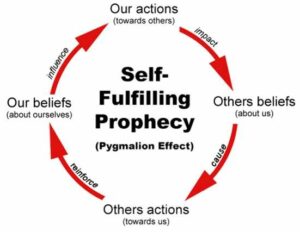
Do you feel like the same situations keep happening to you over and over again? Do you keep attracting partners that don’t fulfill your needs or you face the same problems in different relationships? Are you struggling with the same stresses and conflicts at work, or you keep losing your jobs? It’s like you’re a magnet for people who hurt you, or embarrassing situations, or bullies at work, etc.
I am sure that, at least once in your life, you have said or thought something like: “Why this keeps happening to me all the time?”. And really, why? Is it some kind of a mystic cosmic power that brings these experiences to your life? Fortunately, psychology has a more realistic explanation to why you keep entering the same unpleasant situations all over again. Let’s explore what actually happens.
Frameworks You Live By
From the moment you are born, you are in a survival mode. During your childhood, your little mind is programmed to absorb everything that is happening around you to learn and adapt to your environment. You pull in the thoughts, feelings, beliefs, and ideals of those around you. By interacting with your parents or primary caregivers, you form certain beliefs about yourself, other people, and life in general. These beliefs are the product of the way you interpret the behaviors of your important adults and how they treat your needs, as well as things they tell you about other people, rules, and life in general.
Of course, not all parents are the same. Thus, some will be convinced that life is a fight, you are not allowed to make mistakes and need to be perfect in order to succeed or be loved and appreciated. For others, life will be a scary and dangerous place full of people waiting to hurt you, so you need to be careful who you trust and never let your guard down. Some will, on the other hand, believe that life is easy and fun, that people usually have good intentions, and that, whatever you do, everything will be okay in the end.
These belief systems become the frameworks we live by. They are like colored glasses that affect how we see everything unfolding in our lives. More importantly, these beliefs direct our decision-making, condition our behavior and, ultimately, affect how others react to our behaviors and how they treat us.
 A Self-Fulfilling Prophecy
A Self-Fulfilling Prophecy
Now, imagine a situation where you’re going to a party where you don’t know almost anyone.
Version 1: You’re afraid nobody will talk to you because believe you’re boring or not good with new people. Consequentially, you will probably feel self-conscious and anxious, and enter the party acting awkward, standoffish, and not so friendly. As a result, people will not be encouraged to come to you and start a conversation, which will only, in turn, reinforce the beliefs you already have.
Version 2: You strongly believe that you’re an interesting person and others will be open to meeting you. You think: “This party is going to be great”. People will probably be drawn by your openness and outgoing attitude and come talk to you, which also proves you were right in your beliefs in the first place.
This effect is called a self-fulfilling prophecy, a term coined by famous sociologist, Robert Merton.
Merton noticed that sometimes a belief brings about consequences that cause reality to match the belief. He defined self-fulfilling prophecy as “a false definition of the situation evoking a new behavior which makes the originally false conception come true” (Merton, 1968).

In other words, a self-fulfilling prophecy is a belief or expectation that we hold about a future event that manifests because we hold it. Our expectations and predictions of what will happen to impact our behavior, which shapes how others see us and how they act toward us. In turn, they provide feedback we set ourselves to get in the first place, which serves to reinforce the original belief. Generally, this process is unintentional – we are not aware that our beliefs cause the consequences we expect or fear. And that’s exactly why it’s so difficult to tackle them down and start changing them.
Breaking the Cycle Can Be Hard…
Breaking the cycle of entering the same situations over and over again can be tricky, in the first place because we don’t see our fundamental beliefs as beliefs but as facts about the world. Subconsciously, we need to prove that our beliefs about how life works are “right” because it gives us a sense of security. If we “know” the rules by which the world functions, we feel like we can prepare and know what to expect. That’s why we filter information so it can fit our belief system. We rate experiences that are in line with our beliefs as important “proof” that our frameworks are true, while we label those opposite to our frameworks as unimportant coincidences that won’t impact the way we see the world.
Over time, these patterns of thought and behavior become our automatic response, a sort of habitual reaction to circumstances. Researchers believe we have neural pathways in our brains that are reinforced by habit. The more you repeat the behavior, the stronger your neural pathway for that behavior becomes, and the easier it triggers the next time.
It’s like a forest dirt road – the more you walk on it, the more well-established it becomes. You have an automatic impulse to walk down that well-worn path, rather than on the grassy part. However, this dirt road often leads to the same destination. To break the cycle, you need to consciously resist the urge to stay on the road you know and start walking on the grass in a different direction. Over time, as you repeat taking the same route on the grass, another path will form and it will be easier to walk on.
 …But You Can Do It!
…But You Can Do It!
One thing you can do to make the first step toward exiting the circle of “attracting” the same problems is to, for starters, let go of certainty. It’s important to understand that much of what you think you know about yourself, other people, and life, is more probably a belief and less probably a fact. It is a product of your upbringing and your past experiences. But the good news is that we can choose our beliefs and, therefore, change them.
You can start by choosing a pattern that you want to break out of. Then, write down the past five times when it happened. List all the details about those situations – how did it happened, what led to it, why you think it happened. Now, try to find commonalities across these situations. In the end, try to find what part you play in these situations. Are there any behaviors that might have led you to the common outcome?
Here is a list of questions that might help discover a pattern and your part in it:
- What keeps happening over and over again?
- How does it start?
- What happens next?
- And then what happens?
- How does it end?
- How do you feel after it ends? (John James, 1973)
This process is crucial for changing your patterns. It allows tackling down the reason you might have taken up a particular role and contributed to the outcome that keeps happening. From there, you can set up a goal – what you want to change and what results to get – and then map out a different path from the one you’re taking now.
Changing Your Patterns: Taking the First Steps
Recognizing and understanding the patterns in your life that keep repeating is the first step toward breaking free from them. It’s important to realize that these patterns are not random occurrences but are influenced by your beliefs, expectations, and behaviors. Here are some practical steps you can take to start changing these patterns:
- Reflect on Past Experiences: Take some time to reflect on the situations that keep repeating in your life. Write down the details of the last five times it happened. What were the circumstances? How did it start and unfold? How did you react? How did others react? Reflecting on these experiences can provide insights into the underlying dynamics at play.
- Identify Commonalities and Triggers: Look for commonalities across these situations. Are there specific triggers or circumstances that seem to set off these patterns? Perhaps certain emotions, behaviors, or decisions consistently lead to similar outcomes. Identifying these patterns can help you understand your role in perpetuating them.
- Challenge Your Beliefs: Examine the beliefs you hold about yourself, others, and the world around you. Are these beliefs serving you well, or are they limiting your potential for growth and happiness? Recognize that beliefs are not facts—they are interpretations based on your past experiences and upbringing. Challenge yourself to adopt more empowering beliefs that align with the life you want to create.
- Set Goals for Change: Once you’ve identified a pattern you want to change, set clear goals for yourself. Define what you want to achieve and what steps you need to take to get there. For example, if you tend to attract partners who don’t fulfill your needs, your goal might be to develop stronger boundaries and communicate your needs more assertively.
- Seek Support if Needed: Changing ingrained patterns can be challenging, and it’s okay to seek support from a therapist or counselor. A professional can help you gain deeper insights into your patterns, provide guidance on effective strategies for change, and offer support as you navigate this process.
Breaking free from recurring patterns in your life requires courage, self-awareness, and a willingness to challenge the beliefs that no longer serve you. By taking proactive steps to understand and change these patterns, you can create new pathways toward healthier relationships, greater fulfillment, and personal growth. Remember, you have the power to rewrite your story and shape the future you desire.
It’s okay if you’re not able to identify the reason behind the same situations repeating in your life by yourself. A good therapist can help you figure out where you’re standing and how to proceed.
Please share your thoughts and experiences on the topic down below in the comments, it’s always amazing to hear it! Also, don’t forget to share this post on your social media.
Sources:
